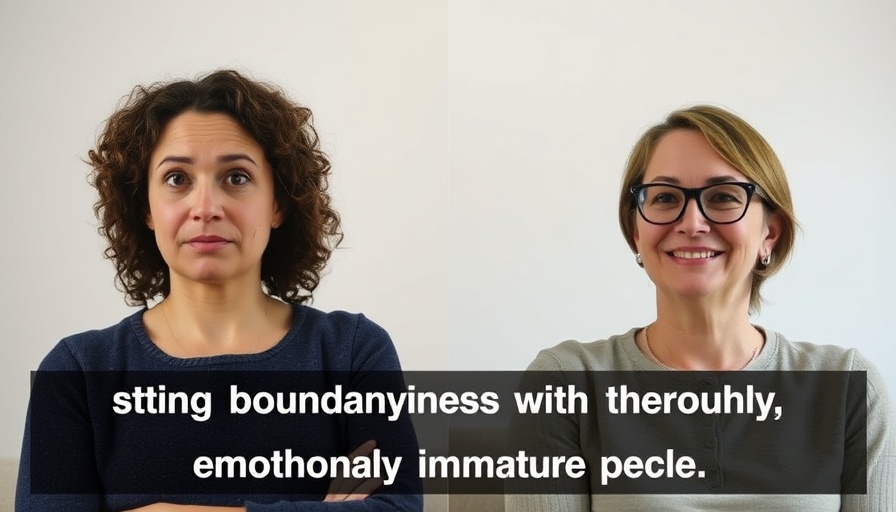
The Importance of Setting Boundaries
Setting personal boundaries is critical for maintaining healthy relationships, especially when dealing with emotionally immature individuals. These are often people who react dramatically to what they perceive as threats to their self-worth. Whether it's a request to refrain from giving a toddler ice cream or to simply call before visiting, their responses can be disproportionate and bewildering. Recognizing that their hypersensitivity stems from an emotional immaturity akin to that of children can help in navigating these waters.
In How to Set Boundaries with Emotionally Immature People - The CLEAR Method w/ Jess Miller, the discussion dives into practical strategies for managing difficult relationships, inspiring a deeper analysis on how to navigate these interactions with emotional maturity.
Understanding Emotional Immaturity
Many of us have encountered emotionally immature people who may respond to boundaries with blame-shifting or defensive behaviors. They often hear boundary-setting as a personal attack rather than a reasonable request. This can lead to a significant amount of stress and anxiety for those trying to establish limits. Consequently, understanding their mindset is critical for effective communication. As Jessica Miller, a licensed marriage and family therapist, explains, these individuals often lack the tools to manage their emotions, leading them to react defensively.
Adjusting Expectations Can Ease Stress
One of the first steps in setting boundaries with emotionally immature individuals is adjusting your expectations. It is essential to recognize that their reactions are not personal; rather, they are reflections of their inability to process their feelings. As assertiveness quickly shifts to defensiveness on their part, the goal should be to keep the communication clear and concise. This allows you to maintain control of your emotional healing without it being hijacked by their impulses.
Utilizing the CLEAR Method
To make boundary setting more effective, the CLEAR method—Communication, Limit, Explanation, Assurance, and Repeat—can be invaluable. This approach prioritizes reaffirming the relevance of the relationship before swiftly conveying the boundary in a simple manner. This framing not only helps ease their defenses but also aligns the request with their needs. Fostering a sense of attachment during the discussion can reinforce their value and diffuse intense reactions.
The Role of Compassionate Communication
Communicating effectively to emotionally immature individuals requires thoughtful language. Expressions of compassion and an emphasis on how a boundary benefits them can often lead to better outcomes. For instance, when discussing a boundary regarding a child’s birthday party, framing it in terms that highlight nurturing the bond between them can garner a more favorable response and diminish their defensive reactions.
Deciding on Estrangement: A Personal Choice
There are instances where complete estrangement becomes necessary. For parents or family members who persistently act in ways that compromise mental health, deciding to go no contact can be a protective measure. Jessica Miller shares her own journey through estrangement when faced with emotionally immature reactions that significantly affected her family's well-being. It is a personal decision that merits careful consideration, weighing the degree of toxic behavior against the potential for change.
The Future of Emotional Understanding
As society becomes more aware of mental health, the hope is for increased understanding around emotional immaturity. Documentation of the neurological impacts of trauma and environmental factors could help demystify the struggles faced by individuals who seem incapable of empathy. Future research and therapy advancements may pave the way for more compassion-based approaches, fostering healing in relationships rather than division.
Embracing a Lifestyle of Clarity and Connection
Ultimately, setting boundaries is a journey towards a healthier lifestyle, less affected by unnecessary conflict and anxiety. The framework of compassionate communication allows us to approach sensitive topics with emotional intelligence. Establishing limits is not merely an act of distancing; it's an act of love that can lead to enriching relationships. By equipping ourselves with effective strategies like the CLEAR method and adjusting expectations, we lay the groundwork for a more peaceful coexistence, both for ourselves and the people we interact with.
As you navigate these challenges, remember that setting boundaries is a sign of strength and self-respect. Don't hesitate to seek guidance through therapy or counseling if you find yourself struggling. You don't have to face these emotional hurdles alone; resources and support can make a world of difference in your journey toward healthier relationships.
 Add Row
Add Row  Add
Add 




Write A Comment